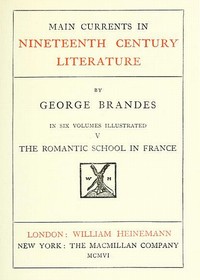Main Currents in Nineteenth Century Literature - 5. The Romantic School in…
"Main Currents in Nineteenth Century Literature - 5. The Romantic School in France" by Georg Brandes is a historical account written in the early 20th century. This volume explores the evolution of literature in France during the Romantic period, particularly focusing on the social, political, and artistic influences that shaped writers like Victor Hugo, George Sand, and Alfred de Musset. The book likely delves into how these writers reacted to the cultural
climate following the upheavals of the French Revolution and the rise of the bourgeoisie, as well as their struggles against established literary conventions. The opening of this work provides a rich backdrop to the Romantic School in France, detailing the political landscape from 1825 to 1835. Brandes discusses how the young generation of writers sought to express their individualistic ideals amid the political reactions that marked the reign of Louis Philippe. The literature of this time is presented as a passionate reaction against the dreary bourgeois materialism of their era, characterized by a longing for artistic liberty and vibrancy. Brandes illustrates the broader context of their struggles against both societal constraints and the artistic conventions of the previous classical period, setting the stage for the emergence of their unique voices and themes. (This is an automatically generated summary.)
Read or download for free
| How to read | Url | Size | |||
|---|---|---|---|---|---|
| Read now! | https://www.gutenberg.org/ebooks/47950.html.images | 897 kB | |||
| EPUB3 (E-readers incl. Send-to-Kindle) | https://www.gutenberg.org/ebooks/47950.epub3.images | 1.4 MB | |||
| EPUB (older E-readers) | https://www.gutenberg.org/ebooks/47950.epub.images | 1.4 MB | |||
| EPUB (no images, older E-readers) | https://www.gutenberg.org/ebooks/47950.epub.noimages | 432 kB | |||
| Kindle | https://www.gutenberg.org/ebooks/47950.kf8.images | 1.6 MB | |||
| older Kindles | https://www.gutenberg.org/ebooks/47950.kindle.images | 1.6 MB | |||
| Plain Text UTF-8 | https://www.gutenberg.org/ebooks/47950.txt.utf-8 | 838 kB | |||
| Download HTML (zip) | https://www.gutenberg.org/cache/epub/47950/pg47950-h.zip | 1.2 MB | |||
| There may be more files related to this item. | |||||
Similar Books
About this eBook
| Author | Brandes, Georg, 1842-1927 |
|---|---|
| Translator | Morison, Mary |
| Translator | White, Diana |
| Title | Main Currents in Nineteenth Century Literature - 5. The Romantic School in France |
| Alternate Title | Main Currents in 19th Century Literature - 5. The Romantic School in France |
| Contents | The political background -- The generation of 1830 -- Romanticism -- Charles Nodier -- Retrospect: foreign influences -- Retrospect: indigenous sources -- De Vigny's poetry and Hugo's "Orientales" -- Hugo and De Musset -- De Musset and George Sand -- Alfred de Musset -- George Sand -- Balzac -- Beyle -- Mérimée -- Beyle and Mérimée -- Mérimée -- Mérimée and Gautier -- Théophile Gautier -- Sainte-Beuve -- Sainte-Beuve and modern criticism -- The drama: Vitet, Dumas, De Vigny, Hugo -- Literature in its relation to the social and political movements of the day -- The overlooked and forgotten -- Conclusion. |
| Credits | Produced by Jens Guld and Marc D'Hooghe (Images generously made available by the Internet Archive.) |
| Reading Level | Reading ease score: 52.6 (10th to 12th grade). Somewhat difficult to read. |
| Language | English |
| LoC Class | PN: Language and Literatures: Literature: General, Criticism, Collections |
| Subject | Literature, Modern -- 19th century -- History and criticism |
| Subject | Naturalism in literature |
| Subject | Romanticism |
| Category | Text |
| EBook-No. | 47950 |
| Release Date | Jan 12, 2015 |
| Most Recently Updated | Apr 4, 2024 |
| Copyright Status | Public domain in the USA. |
| Downloads | 713 downloads in the last 30 days. |
| Project Gutenberg eBooks are always free! | |

